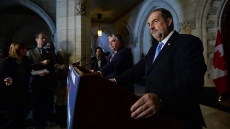OTTAWA — The squeeze of the oil slump is prompting one of Canada's biggest banks to slash its 2015 forecast for the country's economy and warn that another interest-rate cut could be on the way.
TD Bank said Monday it now expects the Canadian economy to grow by just two per cent this year, down from its December projection of 2.3 per cent. It foresees Canadian growth creeping back up to 2.2 per cent in 2016, said a TD report to clients.
The big bank economists also predicted the Bank of Canada will trim its trend-setting interest rate in March by another quarter of a percentage point, to 0.50 per cent. From there, it expects the key rate to remain on hold until the second half of 2016.
Last week, the central bank stunned financial markets and observers when it lowered its overnight-rate target by a quarter of a percentage point to 0.75 per cent. Economists had expected the Bank of Canada to hold the rate at one per cent, where it had been since September 2010.
But in defending his decision, governor Stephen Poloz pointed a finger at the threat of low oil prices, which he called "unambiguously negative" for the Canadian economy.
Poloz indicated the goal of the central bank's rate drop was to provide "insurance" against the risks cheaper oil poses to Canada's inflation and financial stability.
"Those who hoped to return to greater market calm after the holidays have been sorely disappointed," said the TD report.
"The drop in the prices of oil has gone further and been more protracted than anyone predicted only a few short months ago."
The price of oil, which has been trading in the neighbourhood of US$45 per barrel, is less than half of where it was last summer, a change blamed on oversupply and a slowdown in the global economy.
TD expects the U.S. benchmark price — West Texas Intermediate — will average US$47 this year before climbing back up to US$65 in 2016. Only a month ago, the bank forecast WTI to average US$68 in 2015 and US$80 next year.
The weaker outlook for oil prices has also "dimmed" the bank's prediction for the Canadian dollar, trading Monday at just over 80 cents US.
TD now expects the loonie to continue its fall into 2016, hitting a low of 75 cents US early in the year before starting to move back up.
The report also underlined other impacts of low oil prices, which it says will save the average Canadian household nearly $900 at the gas pumps this year.
Additional consequences include job losses in the country's oil-producing regions, where housing markets are also expected to suffer a blow.
On top of that, the report said these energy-rich provinces, and the federal government, should expect lower revenues.
The Harper government recently made the unusual decision of postponing the federal budget until at least April, a move it hoped would buy enough time for a clearer picture to emerge on the impact of falling crude prices.
Ottawa typically releases the federal budget in February or March, before the end of the fiscal year.





